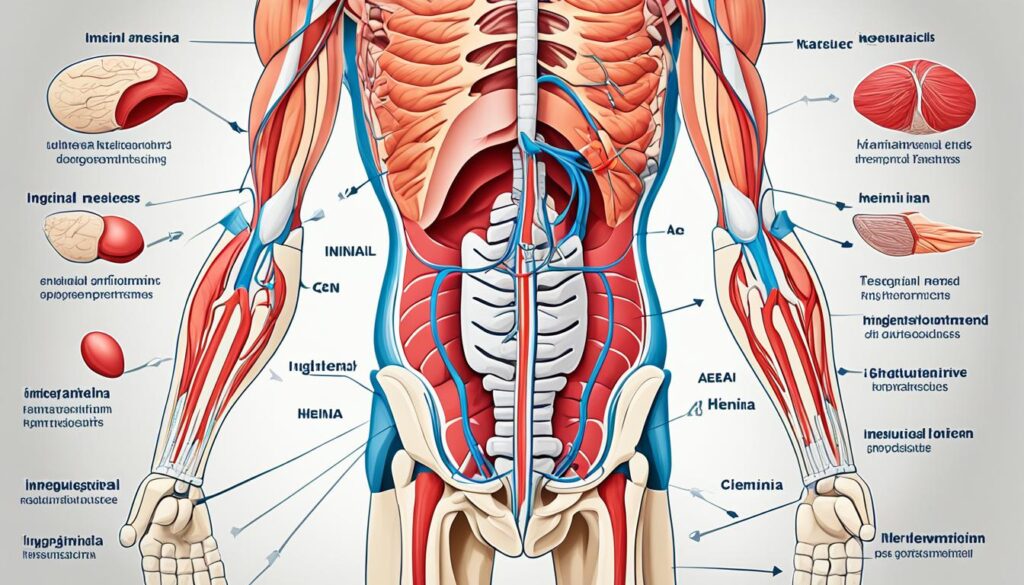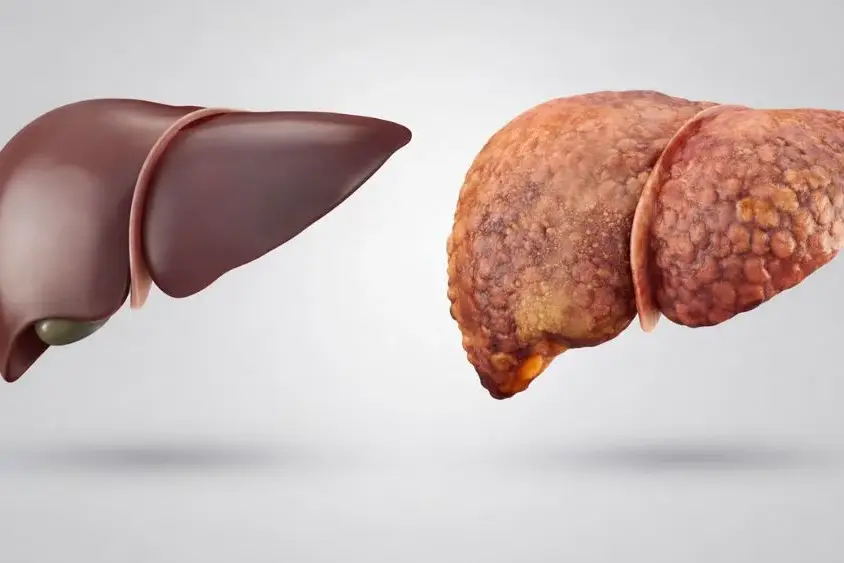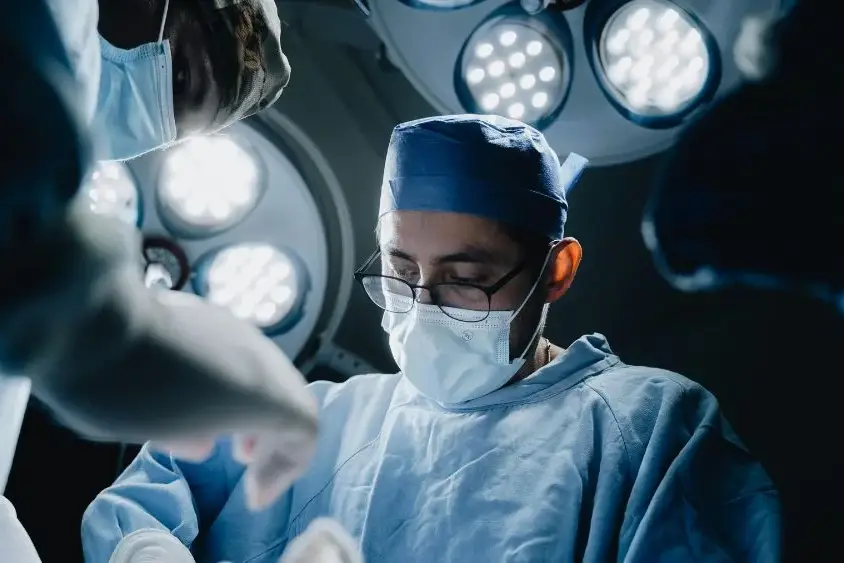Have you noticed a bulge or felt discomfort in your groin area? You might have an inguinal hernia. This issue arises when tissues, like part of the intestine, poke through a weak spot in the belly muscles. Although the bulge can hurt, especially during activities like coughing or lifting, many hernias are painless.
Table of Contents
ToggleInguinal hernias result when the omentum or intestines push through a weak spot in the belly, mostly by the inguinal canal. For men, this canal is where the spermatic cord is. While they are not always dangerous, they won’t get better by themselves and can cause severe problems if ignored. That’s why surgery is often the best option to repair a hernia that’s causing pain or if it’s growing.
Overview of Inguinal Hernia
An inguinal hernia is like a small door in the strong muscles of the belly. This door can open, and parts of our insides can push through, causing a bulge in the groin area. Hernias in this area can be indirect, direct, or femoral, based on where they appear.
Definition and Anatomy
Inguinal hernias happen when parts of our insides, like the intestines, push through a weak spot in the belly muscles. This can create a noticeable bulge or swelling in the groin.
Types of Inguinal Hernia
There are two main types: indirect and direct inguinal hernias. Indirect hernias are more common in kids. They happen because of a birth defect in the belly. Direct hernias often affect older people. They appear due to weakening muscles or aging. Knowing these differences helps doctors choose the best treatment.
Symptoms of Inguinal Hernia
The main symptom of an inguinal hernia is a visible bulge or swelling in the groin, seen on one or both sides. This bulge may get larger when you’re standing, coughing, or putting pressure on your abdomen. For men, the bulge could move into the scrotum.
Bulge or Swelling in the Groin Area
A key sign of an inguinal hernia is seeing a bulge or swelling in the groin. It could show up on either side of the pubic bone. This bulge is easier to spot when you stand, cough, or increase your belly pressure.
Pain or Discomfort During Activities
Besides the bulge, an inguinal hernia might cause pain, aching, or a heavy feeling in the groin. You could feel uncomfortable bending, coughing, or lifting heavy things. These activities tension your abdominal muscles and could worsen the pain.
What Causes Inguinal Hernia?
Inguinal hernias happen when the abdomen faces extra pressure. This can be because of various reasons, including a weak abdominal wall. Knowing these causes is key to managing and avoiding this health issue.
Increased Abdominal Pressure
High pressure in the abdomen is a top cause of inguinal hernias. It comes from things like tough bathroom trips, heavy workouts, or even just from coughing a lot. This pressure makes the guts push through any weak parts in the belly, forming a hernia.
Congenital Weakness in Abdominal Wall
For some, the risk of an inguinal hernia is there from birth. An issue with the belly’s muscle can leave a spot that stays weak. Then, parts of the belly can stick out. This mainly happens in kids and is known as an indirect inguinal hernia.
Aging and Muscle Deterioration
Getting older can make the abdominal wall’s muscles and tissues wear out. This ups the chances of an inguinal hernia. People who smoke and cough a lot face a higher risk. In older adults, this often leads to direct inguinal hernias.
Risk Factors for Inguinal Hernia
Inguinal hernias often happen in some people more than others, for several reasons. Knowing these reasons can show you how to keep from getting an inguinal hernia. Or, it can help you spot the signs early and see a doctor.
Being Male
Men are eight times more likely to get an inguinal hernia than women. The male body has a design that makes this more common. Inside the male groin area is an inguinal canal for the spermatic cord. This is where issues can occur.
Older Age
As we get older, our body’s muscles and tissues can get weaker. This makes it more likely to have an inguinal hernia because the abdominal wall may not be as strong as it was.
Family History
If someone in your family has had an inguinal hernia, you might also be at risk. It can be passed down through genetics. Common living conditions may also play a part.
Chronic Cough or Constipation
A chronic health issue that raises the pressure in your abdomen, like a lasting cough or constipation, can make an inguinal hernia more possible. This added pressure might weaken your abdominal wall over time.
Pregnancy and Childbirth
For women, pregnancy and giving birth can affect the abdomen. This can cause muscle weakness and increase inside pressure. These changes make women more at risk for inguinal hernias.
Complications of Inguinal Hernia
Inguinal hernias may not cause symptoms at first. But if not treated, they can cause serious problems. It’s important to know these risks so you can get help quickly.
Incarcerated Hernia
An incarcerated hernia is where the hernia’s contents are stuck. They’re trapped in a weak part of the stomach. This can block the bowel, causing pain, nausea, and even stopping bowel movements.
Strangulated Hernia
A strangulated hernia is even more severe. It blocks blood flow to the trapped part. This can cause that part of the intestine to die. It’s a very serious condition needing emergency surgery to prevent death or organ damage.
Diagnosis of Inguinal Hernia
Finding an inguinal hernia starts with a detailed medical history and check-up. Your doctor will look at your groin for bulges when you stand or cough. This close look is key to spotting an inguinal hernia.
Medical History and Physical Examination
Your doctor will have you do certain actions to see the hernia better. They’ll ask about any pain or heaviness in your groin. Sharing your medical history is important. It helps the doctor know what to do next for your hernia.
Imaging Tests (Ultrasound, CT Scan, MRI)
If the hernia is hard to see, more tests might be needed. Your doctor could order an ultrasound, CT scan, or MRI. These tests show details about the hernia like its size and location. They help your doctor plan the right treatment.

Treatment Options for Inguinal Hernia
Healthcare pros treat an inguinal hernia by considering the symptoms and hernia size. For small, symptom-free inguinal hernias, watching carefully is common. This includes lifestyle changes.
Watchful Waiting for Small, Asymptomatic Hernias
A small inguinal hernia not causing any issues might not need immediate action. Your doctor could recommend watching it. Lifestyle changes like no heavy lifting help avoid making it worse. But, this isn’t for all inguinal hernia cases.
Surgical Repair
For symptomatic inguinal hernias, doctors usually advise surgery to prevent problems like strangulation. Both open and laparoscopic surgeries offer options with different benefits.
Discuss with your healthcare provider which treatment option fits your inguinal hernia best. Your healthcare team will help you make choices that match your needs and worries.
Open Surgical Repair Techniques
When fixing inguinal hernias, doctors often use open surgery. There are two main kinds of surgeries: those using just your body’s tissues and those with mesh.
Tissue Repairs (Bassini, Shouldice, McVay)
Tissue repair uses your own tissues to close the hernia space, not mesh. Doctors sometimes use Bassini, Shouldice, and McVay methods. These methods aim to strengthen the weak spot in your belly by sewing and tightening your natural tissues.
Mesh Repairs (Lichtenstein, Plug and Patch, PHS)
Mesh repairs, on the other hand, involve putting in a piece of synthetic mesh. This is to make the belly’s weak area stronger. Lichtenstein, plug and patch, and PHS are common mesh surgery types.
Choosing between tissue or mesh repair depends on different factors. This includes what the surgeon prefers, your body, and the risk and benefits. Talking to your doctor is important to decide what’s best for your inguinal hernia.
Laparoscopic Surgical Repair Techniques
More and more, patients are choosing laparoscopic surgery for an inguinal hernia. This method has many benefits. It means smaller cuts, faster healing, and less long-term groin pain than open surgery.
Transabdominal Preperitoneal (TAPP) Repair
The Transabdominal Preperitoneal (TAPP) method is widely used in laparoscopic surgery. It requires making small cuts in the belly. Surgeons can fix the hernia using tiny instruments and a camera. This way, they can put a special mesh in place to strengthen the abdominal wall.
Totally Extraperitoneal (TEP) Repair
Another method is the Totally Extraperitoneal (TEP) repair. Surgeons fix the hernia from outside the peritoneal space. This reduces the risk of harming the bowels. The TEP method also uses a mesh to reinforce the area, preventing hernias from coming back.
Deciding between TAPP and TEP methods is up to the hernia surgeon. Both usually lead to the same good results in skilled hands. Doctors and their teams should work closely before and during surgery. This teamwork helps reduce problems and improve how patients do.
Preparing for Inguinal Hernia Surgery
If surgery to fix your inguinal hernia is recommended, you should get ready. It’s important to prepare well for a better surgery and recovery experience.
Start by following any special instructions your surgeon or care team gives you. These could be about your diet, what medications to avoid, and how to clean yourself. You might need to stop eating certain foods, blood thinners, and avoid some beauty products.
Tell your healthcare team about all the drugs, vitamins, or other supplements you’re taking. They need to know this info. It’s possible some might interfere with the surgery. They might ask you to pause or change some of them.
A few days before surgery, you might need to use a specific soap when you wash. This is to cut down bacteria and infection risk. Don’t shave the area to be treated. Shaving can lead to problems too.
The day of your surgery, aim to show up at the hospital or clinic well-rested and on an empty stomach. This helps prevent upset stomach and other issues with the anesthesia. It makes the whole experience go smoother.
Your healthcare team will be with you all the way. They’re ready to answer any questions and deal with any worries you have. Doing what they say and getting ready properly are the best ways to ensure everything goes well.
Recovery and Aftercare
After inguinal hernia surgery, how you recover at home is crucial. You can usually do light activities in a week or two, like shopping. But, going back to work varies. It might be 1-2 weeks for some, longer if your job involves heavy lifting.
Walking helps healing, but avoid lifting heavy things for a month or more. Driving should wait until you can stop the car suddenly without pain. This might be around 1-2 weeks after keyhole surgery, or longer for open surgery. Talk to your car insurance company before driving again.
The first few days after your surgery might be painful, but it gets better within a week. Some people return to light activities within the first 1-3 weeks. Stick to your usual diet and manage stomach upsets by changing what you eat and drink.
Taking pain medicine is key. Care for the cut includes changing bandages, removing tape, and washing the area. Putting ice on it for short periods can also reduce swelling.
Most people have a smooth recovery, but some might sweat more (1-5%) or need stronger pain meds (10-30%). Getting fully better can take up to six weeks, depending on what you do and your body. You might feel more tired than usual. Avoid hard exercise or sports until your doctor says it’s okay.
Contact your doctor if you feel worse, like having a fever or more pain. Keep up with what your health team advises. Doing so helps you get well and back to normal quickly.
Prevention of Inguinal Hernia
While inguinal hernia surgery is often needed, you can do things to prevent it. Taking steps to avoid or lessen the risk is important.
Maintain a Healthy Weight
Keeping a healthy weight is key. It lowers pressure on muscles and tissues. This helps reduce the risk of getting an inguinal hernia. Being overweight can make you more likely to get one.
Avoid Straining and Heavy Lifting
It’s important to lift correctly and avoid heavy items. When you lift wrong, it strains the abdominal wall. This can lead to an inguinal hernia. Learning to lift properly is crucial for avoiding injuries.
Quit Smoking and Treat Chronic Cough
Stopping smoking and treating a long-lasting cough are important. Smoking makes your muscles weaker. Constant coughing increases the pressure in your abdomen. These can make you more likely to have an inguinal hernia.
Strengthen Core Muscles
Exercising your core muscles is very helpful. It gives better support to your abdominal wall. This can help stop an inguinal hernia from developing. Exercises like planks, bridges, and crunches are great for this.
Conclusion
Inguinal hernias are pretty common and affect a lot of people around the world. We talked about why they happen, what makes them more likely, their signs, and how to treat them. You now know that staying at a healthy weight and being careful with certain activities can keep hernias from starting. And if you already have one, getting help quickly is key.
Doctors can check what’s wrong and suggest the best way to fix it. Sometimes, they might need to do surgery. But, because of new methods and a focus on making sure patients do well, fixing hernias is often very successful.
Taking charge of your health and knowing about hernias can help you stay healthy. Your health is really important, so always look after it and get help when you need to.
FAQ
What is an inguinal hernia?
An inguinal hernia occurs when a part of the intestine pushes through a weak spot in the belly muscles. This causes a bulge that can hurt when you cough, bend, or lift heavy things. Sometimes, you won’t feel any pain from a hernia.
What are the main types of inguinal hernia?
There are two main types. The first is called an indirect hernia. It is common in kids and happens because of a birth defect in the belly. The second type is a direct hernia. It happens as you get older because your muscles get weaker.
What are the symptoms of an inguinal hernia?
Signs of an inguinal hernia include a bulge near the pubic bone. It may show more when you stand and cough. You might feel a burn or ache at the bulge and pain in the groin when you move or lift.
Other signs are a heavy feeling in your groin and weakness. Men may have pain and swelling in the testicles if the hernia pushes down there.
What causes an inguinal hernia?
Inguinal hernias happen when there is too much pressure in your belly. This can be from coughing a lot, straining, or hard work. Some people are born with weak belly muscles, leading to a hernia later in life.
For others, the risk goes up with age, especially if you have close family with hernias. Also, smoking and constipation can raise your risk. Women who are pregnant are more likely to get a hernia because of belly pressure.
Who is at risk of developing an inguinal hernia?
Men have a bigger chance of getting a hernia than women. As you age, your muscles tend to weaken, making a hernia more likely. If someone in your family or you have a hernia, your risk goes up.
Coughing a lot or straining from constipation can also be a cause. Pregnant women face added risk because pregnancy weakens the belly muscles.
What are the complications of an inguinal hernia?
Sometimes, the hernia can block your bowel, causing severe pain and other stomach issues. This is an emergency and needs surgery right away. Without quick treatment, a part of the intestine might die.
This is very serious and can be life-threatening.
How is an inguinal hernia diagnosed?
Doctors can find a hernia by checking for a bulge in your groin. The bulge might become more noticeable when you stand or cough. If it’s hard to see, they might use tests like ultrasound to confirm.
What are the treatment options for an inguinal hernia?
Small hernias that don’t hurt might just be watched carefully. But, if a hernia causes pain or other problems, it’s usually best to have it fixed with surgery.
What are the different surgical techniques for inguinal hernia repair?
Hernia repairs can be done using your own body tissue or with mesh. There are various techniques, some using mesh like Lichtenstein. There are also advanced laparoscopic surgeries that are less painful with quicker recoveries.
How can I prevent an inguinal hernia?
Avoiding heavy lifting and maintaining a healthy weight can reduce your risk. It’s also important to quit smoking and treat any issues that make you cough a lot. Staying active with exercises that strengthen your core can help too.
About The Author

Medically reviewed by Dr. Nivedita Pandey, MD, DM (Gastroenterology)
Senior Gastroenterologist & Hepatologist
Dr. Nivedita Pandey is a U.S.-trained gastroenterologist and hepatologist with extensive experience in diagnosing and treating liver diseases and gastrointestinal disorders. She specializes in liver enzyme abnormalities, fatty liver disease, hepatitis, cirrhosis, and digestive health.
All content is reviewed for medical accuracy and aligned with current clinical guidelines.
About Author | Instagram | Linkedin




